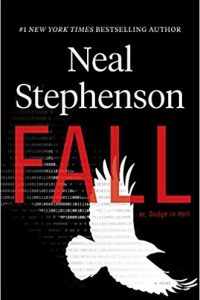Gary K. Wolfe Reviews Piranesi by Susanna Clarke
 Piranesi, Susanna Clarke (Bloomsbury 978-1-635575637, $27.00, 244pp, hc) September 2020.
Piranesi, Susanna Clarke (Bloomsbury 978-1-635575637, $27.00, 244pp, hc) September 2020.
The first thing everyone is going to notice about Piranesi, Susanna Clarke’s long-awaited second novel following her enormously popular Jonathan Strange and Mr Norrell, is that it’s something like a third the length of that blockbuster. The second is that it bears no direct relation to the densely imagined magical 19th century of that novel and of most of Clarke’s short fiction. In place of the sweeping European settings, we find ourselves trapped in a massive, castle-like House with halls and chambers that seem to extend almost infinitely in all directions – and which seems to have an ocean occupying its lower floors. In place of the large and colorful cast of characters, we’re in a world occupied only by the naïve narrator Piranesi and the mysterious Other, along with 13 other corpses and skeletons that Piranesi believes constitute the entire population of the world. Despite what would seem to be such a radical departure on Clarke’s part, there are also some notable similarities: both novels feature the belief that some great and powerful knowledge has gone out of the world and that reclaiming it will restore magical abilities (such as telepathy, shape-changing, and telekinesis), while Piranesi’s own rather formal narrative voice, with its 18th-century-style habit of capitalizing important nouns and its almost simplistic deference to half-understood notions of Science and Reason, lends the whole a vaguely archaic tone. We could hardly be blamed for feeling as though we’ve stumbled into a Gormenghast-like Gothic pile or some sort of existentialist afterlife or a completely self-contained cosmology like in a Ted Chiang story; Piranesi firmly believes that “Outside the House there are only the Celestial Objects: Sun, Moon, and Stars.”
Almost from the beginning, though, we get hints that Piranesi’s world-view is distorted and incomplete. His very name, rather sardonically given to him by the Other, alludes to the 18th-century Italian artist known, among other things, for his almost Escher-like etchings of imaginary prisons and labyrinths. He refers to one of the skeletons he has discovered as the “Biscuit-Box Man” because some of the bones are preserved in a Huntley and Palmers biscuit tin. The endless statues that occupy niches throughout the House are of largely familiar European themes – fauns, centaurs, elephant and castle, etc. At one point, the Other asks Piranesi if he remembers “Batter-Sea” (which he doesn’t, thinking it a word without referent), and produces odd gifts, like bottles of multivitamins and a watch battery. Most telling are Piranesi’s own journals; while his personal system of dating seems purely ritualistic – “THE SEVENTH DAY OF THE FIFTH MONTH IN THE YEAR THE ALBATROSS CAME TO THE SOUTH-WESTERN HALLS” – he reveals that his oldest journal is dated “June 2012 to November 2012.” Clearly, our own world isn’t quite as distant from Piranesi’s universe as it at first seems, and, just as clearly, Piranesi exhibits no knowledge or memory of our world at all. What had begun as a sort of weirdly visionary secondary-world tale now becomes a mystery: who is Piranesi really, how did he come to be in the House, and why does he remember nothing before his arrival there?
To even hint at the answers might compromise the brilliant ways in which Clarke unpacks her narrative – and in fact, turns it into a different narrative altogether – but suffice to say that along the way we encounter tantalizing nuggets about everything from a little-known first-century British king to J.W. Dunne’s notions of serial time (and J.B. Priestley’s related time-slip plays) and minotaur legends (some of the most prominent statues in the House are of huge minotaurs). Eventually, we’ll meet a considerably broader range of characters, including an ominously charismatic occult lecturer and author and a courageous police officer. With Piranesi, Clarke is knowingly taking a number of risks. In place of the wry, knowing Austenian voice of the earlier novel, she offers an ingenuous narrator who remains several steps behind the reader for most of the novel. Character roles remain shifty and indeterminate for much of the story, and questions of the reliability of memory and testimony are never far from the surface. But in the end, the elegant and ingenious structure of the novel lends it a haunting quality which would not be nearly as hypnotic were the story told any other way, and “hypnotic” is the term I find myself returning to in trying to account for the novel’s strange and powerful magic. Piranesi may not be exactly what Clarke’s readers were expecting, but it’s an astonishing narrative performance that, instead, offers them something just as new and intriguing as those 19th-century magicians seemed way back in 2004.
Gary K. Wolfe is Emeritus Professor of Humanities at Roosevelt University and a reviewer for Locus magazine since 1991. His reviews have been collected in Soundings (BSFA Award 2006; Hugo nominee), Bearings (Hugo nominee 2011), and Sightings (2011), and his Evaporating Genres: Essays on Fantastic Literature (Wesleyan) received the Locus Award in 2012. Earlier books include The Known and the Unknown: The Iconography of Science Fiction (Eaton Award, 1981), Harlan Ellison: The Edge of Forever (with Ellen Weil, 2002), and David Lindsay (1982). For the Library of America, he edited American Science Fiction: Nine Classic Novels of the 1950s in 2012, with a similar set for the 1960s forthcoming. He has received the Pilgrim Award from the Science Fiction Research Association, the Distinguished Scholarship Award from the International Association for the Fantastic in the Arts, and a Special World Fantasy Award for criticism. His 24-lecture series How Great Science Fiction Works appeared from The Great Courses in 2016. He has received six Hugo nominations, two for his reviews collections and four for The Coode Street Podcast, which he has co-hosted with Jonathan Strahan for more than 300 episodes. He lives in Chicago.
This review and more like it in the August 2020 issue of Locus.
©Locus Magazine. Copyrighted material may not be republished without permission of LSFF.
 While you are here, please take a moment to support Locus with a one-time or recurring donation. We rely on reader donations to keep the magazine and site going, and would like to keep the site paywall free, but WE NEED YOUR FINANCIAL SUPPORT to continue quality coverage of the science fiction and fantasy field.
While you are here, please take a moment to support Locus with a one-time or recurring donation. We rely on reader donations to keep the magazine and site going, and would like to keep the site paywall free, but WE NEED YOUR FINANCIAL SUPPORT to continue quality coverage of the science fiction and fantasy field.









Great review! I’m very excited to start reading.
I’m sorry that Clarke’s illness caused the incredibly long delay in her publishing new work (and the non appearance of the sequel to her first novel) but Piranesi is so gripping I’ve almost read it through in two evenings. I see you’ve written on David Lindsay – nice to see Piranesi mention a journal Arcturus, alluding to Lindsay’s classic A Voyage to Arcturus, and Colin Wilson, Lindsay devotee supreme.